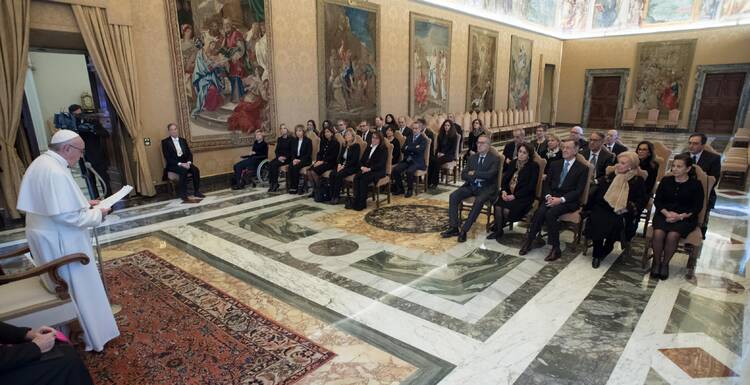A Vatican consultation group will consider initiatives to bolster the fight against corruption and organized crime, including by looking at possibilities for excommunicating members of the Mafia and other criminal organizations.
The Vatican Dicastery for Promoting Integral Human Development published an outcome document Aug. 2 highlighting anti-corruption proposals that came out of the Vatican's first "International Debate on Corruption."
Among the proposals made by the consultation group is the "development of a global response—through bishops' conferences and local churches—to the excommunication of the Mafia and other similar criminal organizations and to the prospect of excommunication for corruption."
Popes and local bishops, especially in Italy, have long warned members of the Mafia that by committing such grave sins, they, in effect, have excommunicated themselves from the church.
In a June 2014 visit to Sibari, in Italy's Calabria region, Pope Francis said that "those who follow the path of evil, like the mafiosi do, are not in communion with God; they are excommunicated."
The June 15 meeting on corruption, sponsored by the dicastery and the Pontifical Academy for Social Sciences, looked at corruption as a global problem and at its connections to organized crime and the Mafia.
Fighting corruption "will not be a simple road to follow," the outcome document said. Coming up with appropriate concrete action will require listening to the church in various parts of the world and entering into dialogue with people of other faiths.
Among the participants at the meeting in June were 50 anti-Mafia and anti-corruption magistrates, as well as bishops and Vatican officials, heads of movements, victims, journalists, scholars, intellectuals and several ambassadors.
Corruption, the document said, is not just an act but a "condition," so the new consultation group will need to address the many forms of corruption through "culture, education, training, institutional action, and citizen participation."
"The consultation group will not just come up with virtuous exhortations, because concrete gestures are needed," the document said. "In fact, a commitment to education requires credible teachers, even in the church."
The group also will seek "to propose a political mindset" to ensure that civil institutions abide by international treaties and that "laws are standardized to best pursue the tentacles of crime, which go well beyond state borders."
However, while laws are necessary, they are "not sufficient" and "an awakening of consciences" is needed so that men and women can perceive the fight against corruption "as a moral obligation."
"We need to act with courage to stir and provoke consciences, shifting from widespread indifference to the perception of the severity of these phenomena, in order to fight them," the document said.
To understand and confront the varying degrees of corruption, the group will "formulate different definitions of 'corruption'" based on the writings of Pope Francis and on explanations given by Cardinal Peter Turkson, prefect of the Vatican Dicastery for Promoting Integral Human Development, in the book "Corrosion."
The book's release coincided with the meeting in June.
In the book's preface, Pope Francis denounced the scourge of corruption as the reason behind the exploitation of people and the environment, the trafficking of humans, arms and drugs, as well as the violation of human rights.
"Corruption, which is in fact a weapon, is the most common language especially of the Mafia and criminal organizations in the world," Pope Francis wrote.
Corruption, he added, is "a process of death that lends itself to the culture of death" espoused and promoted by the Mafia.










